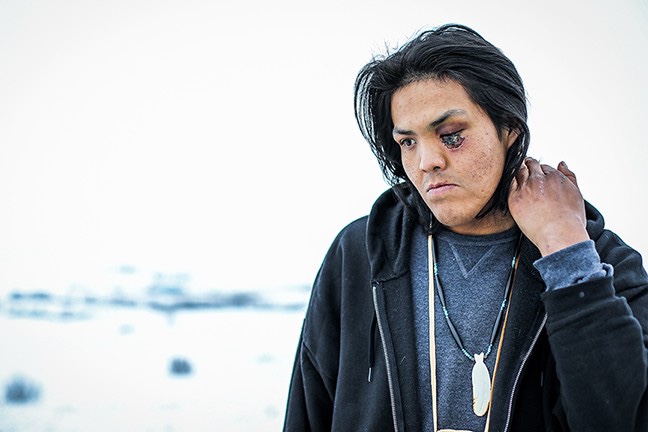Here is the opinion in Mitchell v. Kirchmeier.

Briefs:
Here is the opinion in Mitchell v. Kirchmeier.

Briefs:
Here.
Here.
My chapter, “Resisting Congress: Free Speech and Tribal Law,” from our book, The Indian Civil Rights Act at Forty.
Here is the abstract:
Congress codified the unsettled tension between American civil rights law and American Indian tribal law, customs, and traditions in American Indian communities by enacting the Indian Civil Rights Act (ICRA) in 1968. Concerned that individual rights were receiving short shrift in tribal courts and by tribal governments,Congress chose to apply a modified form of the Bill of Rights on tribal governments. In other words, Congress chose to impose American legal norms on Indian governments in order to protect those under tribal jurisdiction.As it had done previously in statutes such as the Indian Reorganization Act, Congress affirmatively sought to displace tribal law — and all the attendant customs and traditions, as well as Indian values — with American law. Ironically, after the Supreme Court interpreted ICRA in 1978, this law could only be interpreted and enforced by tribal courts. Tribal law and American civil rights law have been at odds in many tribal communities ever since, as tribal voters, legislatures, and courts have struggled with how (and whether) to apply American civil rights law in Indian country.
In this chapter, I explore several questions relating to tribal courts, tribal governments, and the Indian Civil Rights Act. For example, do tribal decision makers (i.e., voters, legislatures, and especially courts) deviate from the state and federal government and court interpretations of the Bill of Rights in applying ICRA; and if so, how much and in what way? Do tribal decision makers apply or incorporate tribal law, customs, and traditions into their decisions relating to civil rights under ICRA (and tribal laws that incorporate ICRA’s provisions); and if so, how? Are tribal decision makers truly bound by the provisions of the ICRA?The last question begs a final question: Does Congress have authority to force tribal decision makers how to decide civil rights disputes?
From the Seattle Times:
Exercising its rights as a sovereign nation, a small Indian community has banned the local newspaper from its reservation for publishing details about the horrific killing of a member of the tribe.
Elsewhere, such a move would have prompted a debate on freedom of speech.
But in the remote town nestled in northern New Mexico’s mesas and red rocks, the ban is an example of press freedoms long accepted throughout the U.S. running up against tribal sovereignty.
The leaders of the Jemez Pueblo were horrified by the seven-paragraph story in the Jemez Thunder newspaper that recounted the killing.
Here is the opinion.
News coverage from Indianz:
 The Karuk Tribe of California won its free-speech lawsuit over a salmon advertisement that was rejected by a a public transit agency in Oregon.
The Karuk Tribe of California won its free-speech lawsuit over a salmon advertisement that was rejected by a a public transit agency in Oregon.
The tribe and an environmental group called Friends of the River wanted to place the Salmon for Savings ad on Tri-County Metropolitan Transportation District of Oregon (TriMet) buses. It was rejected because TriMet said it was not a commercial ad or a public service announcement. But Judge Henry C. Breithaupt of the Oregon Tax Court said the policy violated the U.S. and Oregon constitutions. The ad promotes the removal of dams in the Klamath River Basin to restore salmon runs.
Get the Story:
TriMet loses case over its ad rejection (The Oregonian 6/4)
Tax Court upholds tribe in lawsuit against Tri-Met (AP 6/3)
Press Release: Judge Rules Against TriMet in Free Speech Case over Klamath Dams Ad (IndyBay Media 6/3)
Related Stories:
Karuk Tribe sues over rejected salmon advertisement (2/21)
Patrick M. Garry (South Dakota), Candice Spurling (South Dakota), Jennifer Keating (South Dakota), and Derek Nelson (South Dakota) have posted “Tribal Incorporation of First Amendment Norms: A Case Study of the Indian Tribes of South Dakota” on SSRN, recently published in the South Dakota Law Review.
From the abstract:
This article analyzes how Indian tribal courts have incorporated First Amendment norms within tribal legal systems. Given the more traditionally communal nature of tribal societies, Indian tribal courts have taken a slightly different approach to the kind of individual rights articulated in the First Amendment. As this article demonstrates, tribal courts have elevated community interest and values when considering individual rights issues. The ways in which those interests and values have been elevated may prove instructive to those who advocate a more balanced approach to First Amendment freedoms within the U.S. judicial system.
The article examines the legal obligation imposed on Indian tribes to protect certain individual rights, and whether the First Amendment applies to Indian tribes, and finally how the Indian Civil Rights Act applies. The article analyzes how federal courts have interpreted the Indian Civil Rights Act and surveys Indian tribal court decisions concerning individual rights issues such as free speech, free press, and free exercise of religion.
The final part of the article analysis turns away from reported tribal court decisions and focuses on tribal political, social, and cultural issues relating to First Amendment-type rights. In this respect, the article focuses exclusively on the nine tribes of South Dakota, exploring how First Amendment-type issues have arisen within those tribes and how they have been resolved outside of the judicial system.
You must be logged in to post a comment.